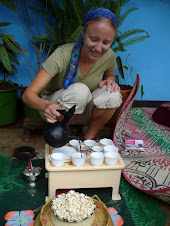(I feel I should warn readers that this post is rather depressing. It contains no fun stories and is mostly a technical and philosophical discussion of some of the many dilemmas inherent to working in international development. I debated as to whether or not to post this, but this blog would feel dishonest to me without it.)
Yesterday, KB and I met a young girl from
It comes as no great surprise that the needs here are many, the challenges are complex, and the work is difficult. It is more than enough to send a young compassionate volunteer packing her bags. Theoretically, the difficulties and emotional strain should be offset by the satisfaction of having helped people and touched lives. This realm of international development and foreign assistance is especially demanding, though, and potentially depleting, because you rarely have full assurance of having done a good thing.
To begin with, the problems are multifaceted, involving innumerable closely intertwined issues. I have been told by my supervisor that I will be working especially with the local PLWHA group. When KB and I were introduced to this group two days ago, one man spoke up to relate to us what he considered their biggest problem: We have no money to buy the food we must have in order to take our antiretroviral drugs. It is a common challenge in administering ARVs in low-income countries. Food is needed in order to take ARVs. Money is needed in order to buy food. Without money (though the drugs themselves are free), ARVs cannot be taken. But without taking ARVs, HIV-positive people become too sick to work and earn money. The poor become sick; the sick become poor. It is a vicious cycle of illness and poverty that is not easily broken. And this doesn’t even include the political, legal, social, and environmental spheres in which this cycle exists. In the case of PLWHA, for example: Government policy may fail to make HIV/AIDS control and prevention a priority, possibly even denying its existence. Government leaders may squander, misallocate, or embezzle funds designated to address HIV/AIDS and support PLWHA. Unsound economic policy may stymie growth and limit opportunities for individual wealth accumulation. Legal structures (or lack thereof) may hinder entrepreneurship and reliable income generation. Social stigma surrounding HIV/AIDS may ostracize PLWHA and disallow them from holding stable jobs within the community. Furthermore, stigma may prevent people from coming forth for testing and treatment services altogether, making the ART-nutrition issue a moot point. Finally, a lack of natural resources, or a failure to properly take advantage of natural resources, may hinder the economic growth of a nation as a whole and limit options for income generation. And even THIS discussion fails to address how gender inequality, harmful cultural practices, and lack of economic opportunities contribute to the SPREAD of HIV/AIDS, thus adding to the number of PLWHA and perpetuating the problem. When faced with the immensity and complexity of this tangled web of issues, how do you even decide where to start? And how do you confidently address one aspect of the problem, knowing that roadblocks in other aspects may render your efforts ineffectual?
I have been asked by the PLWHA group to assist them with “income generation.” The term makes it sound as if I will wave my magical B.A. in Economics to conjure money out of thin air. The reality, though, is that most of the local business ventures I would help design would ultimately succeed in shuffling money from one group of people with greatly limited resources, to another group of people with greatly limited resources. Of course, the more accurate description of what I am expected to do is that I will wave my magical
The extent of foreign assistance in Debremarkos is absolutely astounding. If you inquire deeply enough into ANYTHING in this town, you will discover the hands of foreign donors. USAID stickers adorn copy machines, computers, overhead projectors, and covers of intimidating stacks of record books in local schools, NGO offices, and government administration buildings. Large trucks rattling down the Italian-funded paved road carry USAID-provided bags of wheat to market. The brand new eye center at the local hospital displays a plaque bearing the names of German Rotary members. Four new classrooms at a local school were funded by a rich German missionary couple. And this all discovered in just my first four days here – I am sure I have only scratched the surface. The remarkable extent of this foreign presence, while enabling noble results in the short run, leads me to wonder about the long run. What will this do for
I know these are not new questions, and I know I am not the only one to ask them. I suppose all of us stumble forward as best we can, but sometimes the uncertainty, for me, is enough to be crippling. Undecided as to the right course of action and knowing the potential for great harm resulting from a wrong course, I fear to take any action at all. I came here, though, which was an action in and of itself. Now I must choose what to do with it. Igziabher yat’inagn. (May God give me courage.)

No comments:
Post a Comment